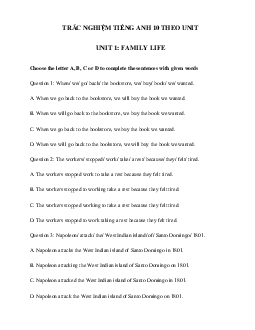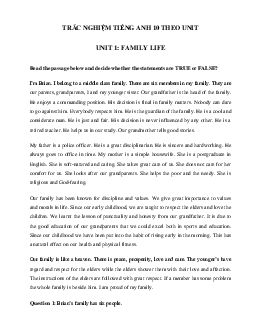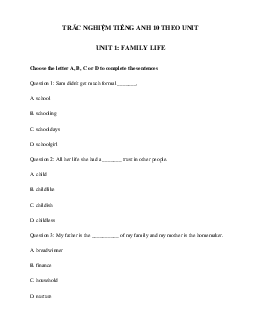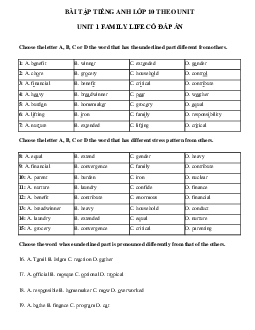








Preview text:
UNIT 1: FAMILY LIFE
1. Put these words into the correct column. Then pronoun the words exactly. trace trendy bright break tree brick train crimp broom crime treat crown crack brain cream /tr/ /br/ /kr/ II. VOCABULARY
1. Look at the picture and write the correct phrase under each picture. (There are 4 unnecessary phrases) prepare lunch take out rubbish clean the floor cook wash dish do the heavy things fold clothes do the gardening make the bed mown the lawn do the laundry shop for groceries 1. 2. 3. 4. 5. 6. 7. 8.
2. Match a verb with a noun to make a phrase verb. Then write your answers in the box. No. Verb Opt. Noun 1 sweep A for groceries 2 shop B breakfast 3 be responsible C toys 4 prepare E the floor 5 do F the car 6 pick up G for finance 7 wash H the dog 8 walk I the heavy things 4 Your answer: 1. 2. 3. 4. 5. 6. 7. 8.
3. Make a phrase with each phrase verb in 2. 1. sweep the floor: 2. shop for groceries:
3. be responsible for finance: 4. prepare breakfast: 5. do the heavy things: 6. pick up toys: 7. wash the car: 8. walk the dog: II. GRAMMAR
I. Put the verb in the correct form, present simple or present progressive.
1. Sit down! A strange dog (run) to you. 2. My mom often (buy) meat from the butcher‟s. 3. My brothers (not/ drink) coffee at the moment. 4. Look! Those people (climb) the mountain so fast. 5. That girl (cry) loudly in the party now.
6. These students always (wear) warm clothes in summer. 7. What (you/ do) in the kitchen? 8. I never (eat) potatoes. 9. The 203 bus (set off) every fifteen minutes. 10. Tonight we (not/ go)
aren't going are not going to our teacher‟s wedding party.
II. Put the verb in the correct form, present simple or present progressive. 1. A: What ! (you/ do)? B: I (write) to my parents. I
(write) to them every weekend. 2. A: Look, it (snow).
B: It‟s beautiful! This is the first time I‟ve ever seen snow. It (not snow) in my country.
3. A: Oh, that‟s Adrian. He‟s new here. B: Really? Where (he/ live)? (you/ know)? A: Yes. He (live) in Milan, but now he (stay) with his aunt on Shirley Road. 4. A: What time (you/ usually/ finish) work? B: Normally I
(finish) work at five o‟clock, but this week I (work) until six to earn a bit more money. 5. A: How (you/ travel) to work?
B: I haven‟t got a car at the moment, so I (go) to work on the bus this week. Usually I (drive) to work.
6. A: I think we‟re going the wrong way. 5
B: I don‟t think so. The sun
(rise) in the east, remember. It‟s behind us, so we (travel) west. 7. A: (you/ look) for someone? B: Yes, I
(need) to speak to Neil. Is he in? A: Yes, but I (think) he‟s busy. He
(talk) to the boss at the moment. 8. A: I (want) a new computer. I (save) up to buy one. B: But computers
(cost) so much money. What‟s wrong with the one we‟ve got? A: It (get) out of date now. 9. A: Your new dress (look) very nice.
B: Thank you. The trouble is it (not/ fit) properly. I (not/
know) why I bought them, really. 10. A: What (you/ do)? B: I (taste) the sauce. It (taste) too salty.
III. Put the verb in the correct form, present simple or present progressive.
It (0. be) is Sunday evening and my friends and I (1. be) at Jane's birthday party. Jane (2. wear)
a beautiful long dress and (3. stand)
next to her boyfriend. Some guests (4. drink) wine or beer in the comer of
the room. Some of her relatives (5. dance) in the middle of the room. Most people (6. sit) on chairs, (7. enjoy) foods and (8. chat)
with one another. We often (9. go) to our friends' birthday
parties. We always (10. dress) well and (11. travel) by taxi. Parties never (12. make)
us bored because we like them.
IV. Complete the sentences by using either the present simple or the present progressive of the verbs in the box. bite bleed flow rain leave grow belong take seem shine wake 1. The River Nile into the Mediterranean.
2. This book is mine. That one to Pierre. 3. Look at Joan. She
her fingernails. She must be nervous. 4. We usually vegetables in our garden. 5. Let‟s go out. It (not) now. 6. Every morning, the sun in my bedroom window and me up.
7. Jim is very untidy. He (always)
his things all over the place. 8. Ann very happy at the moment. 9. He‟s a photographer. He a lots of photos.
10. Oh! What‟s the matter with your hand? It .
V. Complete these sentences, using the future simple or the present simple of the verbs in brackets. 1. I (phone) you when I (get) home from work.
2. I want to see Margaret before she (go) out.
3. We're going on holiday tomorrow. I
(tell) you all about it when we (come) back. 6
4. Brian looks very different now. When you (see) him again, you (not/ recognize) him.
5. We must do something soon before it (be) too late.
6. I don‟t want to go out without you. I (wait) until you (be) ready.
7. Sue has applied for the job but she isn‟t very well qualified for it. I (be) surprised if she (get) it.
8. I‟d like to play tennis tomorrow if the weather (be) nice.
9. I‟m going out now. If anybody (phone) me while I (be) out, can you take a message? 10. It‟s raining hard. We (get) wet if we (go) out. As soon as it (stop) raining, we (leave).
VI. Write in full sentences using the given words. (Use the present simple or present continuous)
1. He/ often/ have/ breakfast/ late.
2. You/ do/ the housework/ at the moment?
3. I/ not/ go/ to school/ on weekends.
4. John‟s girlfriend/ wear/ a red T-shirt/ now. 5. They/ like/ beer or wine?
6. What/ he/ usually/ do/ at night?
7. The teacher/ never/ lose/ his temper.
8. Why/ you/ listen/ to music/ loudly/ now? IV. READING
1. Read the passage and choose the best answer.
Jean spent her first few years in Hooper and her family moved to Otsego early in her life.
She was only ten when her father died unexpectedly, leaving her mother to raise and support
their family alone. Her mother soon went to work outside the home to provide for the family,
and Jean, being one of the oldest, had to help care for her younger siblings. Although she had
much responsibility at home, Jean thoroughly enjoyed school and was an excellent student.
She went on to graduate 10th in her class at Otsego High School in 1953.
While still in high school, Jean met a young man named Charles "Chuck" Holly, at a
dance in Alamo; and they were quite taken with each other. Over the next few years, their
love for each other blossomed and they were married on February 24, 1953, while Jean was
still in school. At the time, Chuck was serving his country in the military, and had come
home on leave to marry his sweetheart. Unfortunately, shortly thereafter, he was sent
overseas to serve in Korea for the next fifteen months. 7
Upon his discharge, the couple settled into married life together in the Plainwell, Otsego
area. To help make ends meet, Jean went to work at the collection bureau in Kalamazoo for a
while, before taking a job at the cheese company in Otsego. In 1964, Chuck and Jean were
overjoyed with the birth of their son, Chuck, who brought great joy into their lives. Jean
remembered how her mother was always gone so much working after her father died and she
did not want that for her son, so she left her job to devote herself to the role of a mother.
1. Before Jean's father passed away, her mother used to . a. work outside the home b. be a housewife c. support the family alone d. work as a secretary 2.
Which is not referred to Jean?
a. She was a responsible girl.
b. She never helped her mother with household chores.
c. She often did well at school. d. She went to high school. 3. Jean's husband was a . a. teacher b. dancer c. soldier d. servant 4. Jean . a. served in the military
c. lived in Korea for fifteen months c. had a daughter
d. got married when she was a student
5. Which is not true about Jean?
a. She disliked staying at home and taking care of her child.
b. She worked outside the home before she had a child.
c. She was very happy when she got a baby.
d. She quit her job to look after her baby.
2. Fill in each numbered blank with one suitable word or phrase. There are many reasons (41)
taking regular time with our family is important: ü It (42)
a place to listen, teach, learn, and (43) ourselves freely and safely. ü It provides (44)
to discuss family joys, issues, and problems.
ü Family members can practice skills in a non-threatening (45) . ü Families are a (46)
part of our society and the fabric of our communities – we
spend (47) time together to get our feelings (48)
belonging, our values, support and understanding.
ü It helps (49) family members together and feel safe in today's world where (50)
can lead to family disintegration 1. A. that B. why C. when D. which 2. A. creates B. invents C. develops D. makes 3. A. think B. show C. express D. say 4. A. opportunities B. conditions C. situations D. circumstances 5. A. air B. nature C. space D. atmosphere 6. A. attractive B. real C. deep D. basic 7. A. a B. an C. the D. no article 8. A. in B. of C. on D. for 9. A. keep B. keeping C. kept D. with keeping 10. A. push B. press C. pressure D. pull 8 V. SPEAKING
1. Make a list of household chores in your family.
LIST OF HOUSEHOLD CHORES
1. ....................................................
6. ....................................................
2. ....................................................
7. ....................................................
3. ....................................................
8. ....................................................
4. ....................................................
9. ....................................................
5. ....................................................
10. ..................................................
2. Among these household chores, which do you like and which do you dislike? Tell the
reason why you don’t like it. Report you answer in oral speech and record your talk. LIKE DISLIKE Name of chore Reason Name of chore Reason
................................
................................
................................
................................
................................
................................
................................
................................
................................
................................
................................
................................
................................
................................
................................
................................ IV. WRITING
1. List of household chores that each of your family member is responsible for. Name of chore Reason Name of chore Reason
................................
................................
................................
................................
................................
................................
................................
................................
................................
................................
................................
................................
2. Write a short paragraph about housework sharing in your family.
www.thuvienhoclieu.com Trang 9 ĐÁP ÁN UNIT 1: FAMILY LIFE A. PHONETICS
1. Put these words into the correct column. Then pronoun the words exactly. /tr/ /br/ /kr/
trace, train, treat, tree, trendy
brain, break, brick, bright, crack, cream, crime, crimp, broom crown II. VOCABULARY
1. Look at the picture and write the correct phrase under each picture. (There are 4 unnecessary phrases) 1. wash the dish 2. do the laundry 3. fold clothes 4. do the gardening 5. mow the lawn 6. take out rubbish 7. clean the floor 8. shop for groceries
2. Match a verb with a noun to make a phrase verb. Then write your answers in the box. 1. sweep the floor 5. do the heavy things 2. shop for groceries 6. pick up toys 3. be responsible for finance 7. wash the car 4. prepare breakfast 8. walk the dog
3. Make a phrase with each phrase verb in 2.
1. Lan sweeps the floor every day.
2. My mother shops for groceries in the morning.
3. My father is responsible for finance.
4. Tony and Lam are preparing breakfast in the kitchen.
5. My father always does the heavy things for my mother.
6. Mai usually picks up toys after playing with her little brother.
7. My mother don‟t like washing car but she likes cleaning the floor.
8. I often walk the dog in the park in my free time. II. GRAMMAR I.
Put the verb in the correct form, present simple or present progressive. 1. is running 6. wear 2. buys 7. are you doing
3. aren't drinking/ are not drinking 8. eat 4. are climbing 9. sets off 5. is crying
10. aren't going/ are not going
II. Put the verb in the correct form, present simple or present progressive.
1. are you doing - am writing - write
2. is snowing - doesn‟t snow
3. does he live - Do you know - lives - is staying
4. do you usually finish - finish - am working
5. do you travel - am going - drive 6. rises - are traveling
7. Are you looking.- need - think - is talking
www.thuvienhoclieu.com Trang 10
8. want - am saving - cost - is getting
9. looks - doesn‟t fit - don‟t know
10. are you doing - am tasting - tastes
III. Put the verb in the correct form, present simple or present progressive. 1. are 7. enjoying 2. is wearing 8. chatting 3. is standing 9. go 4. are drinking 10. dress 5. are dancing 11. travel 6. are sitting 12. make
IV. Complete the sentences by using either the present simple or the present progressive of the verbs in the box. 1. flows 6. shines - wakes 2. belongs 7. is always leaving 3. is biting 8. seems 4. grow 9. takes 5. isn‟t raining 10. is bleeding
V. Complete these sentences, using the future simple or the present simple of the verbs in brackets. 1. will phone 6. will wait – are 2. goes 7. will be – gets 3. will tell – come 8. is 4. see - won't recognize 9. phones – am 5. is
10. will get - go - stops - will leave
VI. Write in full sentences using the given words. (Use the present simple or present continuous)
1. He often has breakfast late.
2. Are you doing the housework at the moment?
3. I do not go to school on weekends. |I don't go to school on weekends.
4. John's girlfriend is wearing a red T-shirt now. 5. Do they like beer or wine?
6. What does he usually do at night?
7. The teacher never loses his temper.
8. Why are you listening to music loudly now? IV. READING
1. Read the passage and choose the best answer. l. b 2. b 3. c 4. d 5. a
2. Fill in each numbered blank with one suitable word or phrase. l. b 2. a 3.c 4. a 5. d 6. d 7. d 8. b 9. a 10. c V. SPEAKING
1. Make a list of household chores in your family.
Suggested answer (Câu trả lời gợi ý) 1. set the table 6. cut the grass 2. wash the dishes 7. water the flowers
www.thuvienhoclieu.com Trang 11 3. make the bed 8. wash the family car 4. dust the ornaments 9. take out the garbage 5. do the laundry 10. clean up the bathroom
2. Among these household chores, which do you like and which do you dislike? Tell the
reason why you don’t like it. Report you answer in oral speech and record your talk.
Suggested answer (Câu trả lời gợi ý) LIKE DISLIKE Name of chore Reason Name of chore Reason set the table It is meal time, and I wash the dishes My hands get greasy. like to eat. do the laundry My family has a cut the grass It hurts my back. washing machine, so it is an easy work. water the flowers The flowers look nice
clean up the bathroom It is dirty and it is a and smell good. hard work.
wash the family car I can play with the take out the garbage It is dirty. sprinklers. make the bed The bed looks dust the ornaments It is dusty and may organized, I can put hurt my throat. my toys on the bed. IV. WRITING
Each of the member in your family has some household chores to do. Make a list of
household chores that each member is responsible for. Then write a short paragraph
about housework sharing in your family
1. List of household chores that each of your family member is responsible for.
Suggested answer (Câu trả lời gợi ý) Your father Your mother Your brother/ You sister
Fixing electrical things Cooking washing the dishes Setting up the table Doing gardening Doing shopping Doing the laundry Helping my mother in Dust the ornaments Making the bed the kitchen Cleaning the bathroom
2. Housework sharing in my family
Suggested answer (Câu trả lời gợi ý)
Unlike many families where the mother has to take care all of household chores, my family
shares the housework fairly. My father, John, who is tall and strong, takes responsibilities for the
gardening. He cuts the hedge, waters the plants and mows the lawn. My mother Emily does the
cooking and shopping. My sister Joanna is 10 years old, and she is responsible for making the
bed and setting the table. The last member of the family, me - Susan, is in charge of cleaning up
all the rooms and take out the garbage every night. Because of sharing the chores, each member
has more time to relax and does their own work. We are a happy family.
www.thuvienhoclieu.com Trang 12




